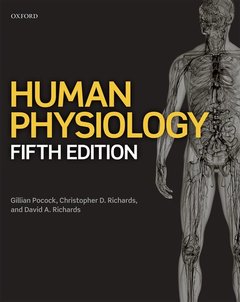Description
Human Physiology (5th Ed.)
Authors: Pocock Gillian, Richards Christopher D., Richards David A.
Language: English
Subject for Human Physiology:
83.98 €
In Print (Delivery period: 21 days).
Add to cart
Publication date: 12-2017
944 p. · 22.2x27.7 cm · Paperback
944 p. · 22.2x27.7 cm · Paperback
Description
/li>Biography
/li>
The human body is a complicated and beautiful machine, governed by the laws of physics and chemistry. By understanding its physiology - how it performs its varied functions - it is possible to build strategies for diagnosis, treatment, and prevention of disease. In this latest edition, expanded and restructured coverage of sensory physiology and the respiratory system, a new comprehensive glossary of key terms, and additional online learning resources make Human Physiology even more student-friendly than its predecessors. Human Physiology provides clear explanations of the principles that govern the body's physiological processes and shows how these can be applied. This is the ideal course companion for any student needing a solid foundation in the subject for a future career in human biology, biomedical science, or medicine. Online resources Student resources - Numerical and clinical problems - Multiple choice questions - Web links Lecturer resources - Figures from the book
Gillian Pocock read Physiology at the University of Oxford before moving to Kings' College London to study for her PhD under the supervision of P.F. Baker. She held a post-doctoral position at Kings' College before taking up an appointment in the Department of Physiology, Royal Free Hospital School of Medicine. She is now Senior Lecturer in Clinical Science in the School of Nursing at Canterbury Christ Church University, UK. Her research interests have focussed on the role of calcium in secretion and pH regulation in neurons. Christopher Richards read Biological Chemistry at the University of Bristol. He completed his PhD in the Department of Zoology, University of Bristol, under the supervision of P.C. Caldwell before taking up a position at the Institute of Psychiatry in London. He subsequently moved to the National Institute for Medical Research where he was a member of the scientific staff. He later held posts in the Departments of Physiology at the Royal Free Hospital School of Medicine and University College London where he is currently Emeritus Professor of Experimental Physiology. He has published over 100 scientific articles, chiefly on the physiology and pharmacology of nerve cells. David Richards studied biochemistry at the University of Bristol before beginning his PhD at the National Institute for Medical Research and University College, London under the supervision of T.V.P. Bliss. After postdoctoral positions at the University of Colorado School of Medicine, the University of Zurich Brain Research Institute and the University of Wisconsin School of Medicine, he was appointed Assistant Professor at the University of Cincinnati College of Medicine, before moving to Cincinnati Children's Hospital Medical Center. He is now Associate Professor of Neuropharmacology at Husson University School of Pharmacy in Maine. His research focuses on the cell biology that supports synaptic transmission.
© 2024 LAVOISIER S.A.S.
These books may interest you

Anatomy & Physiology For Dummies 26.10 €

Physics of the Human Body 100.21 €


